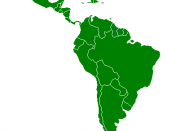Grupo Bimbo continuous expansion with an ambition to become one of the five-largest bakers in the world, while the company's performance in existing foreign markets should be improved so fore made profitable and keep company away from financial hazard due to acquiring losses and lack of substantial profit from foreign markets.
Almost 70% of Grupo Bimbo's sales came from Mexico, where the company had built a 90% market share in the packaged bread segment, the business was very profitable and the company operated in growing market.
However, the investments in U.S. and Latin America, where markets were highly competitive, have not been profitable. According Grupo Bimbo's global strategy - to become one of the five-largest bakers in the world - it had launched a series of strategic initiatives to make foreign operations successful. In March/April, it had purchased the Beijing Panrico Food Processing Center that had already established operations in China.
Sub-problemsâ¢Grupo Bimbo should adapt its distribution networks to each country's differences (union's pressure in U.S., inexperienced independent operators in Brazil, modifying China's distribution structure to rely on bicycles). Because of nature of the products (fresh bread), Grupo Bimbo must service stores directly, on a daily basis. This places tremendous demands on the distribution network to guarantee uninterrupted, fresh product deliveries. The wide geographical spread of the business created by Bimbo's rapid international expansion called for complicated logistical planning to keep the business functioning efficiently.
â¢Very different markets in Mexico, the United States, Latin America and China required distinct ways of operating activities and price setting standards. While 80% of Mexico sales still were through 'mom and pop' stores, allowing to control where, when, how and for what price products were sold, 80% of the sales in U.S. and 70% in Latin America transpire through large supermarkets.


